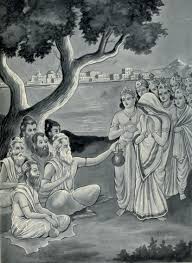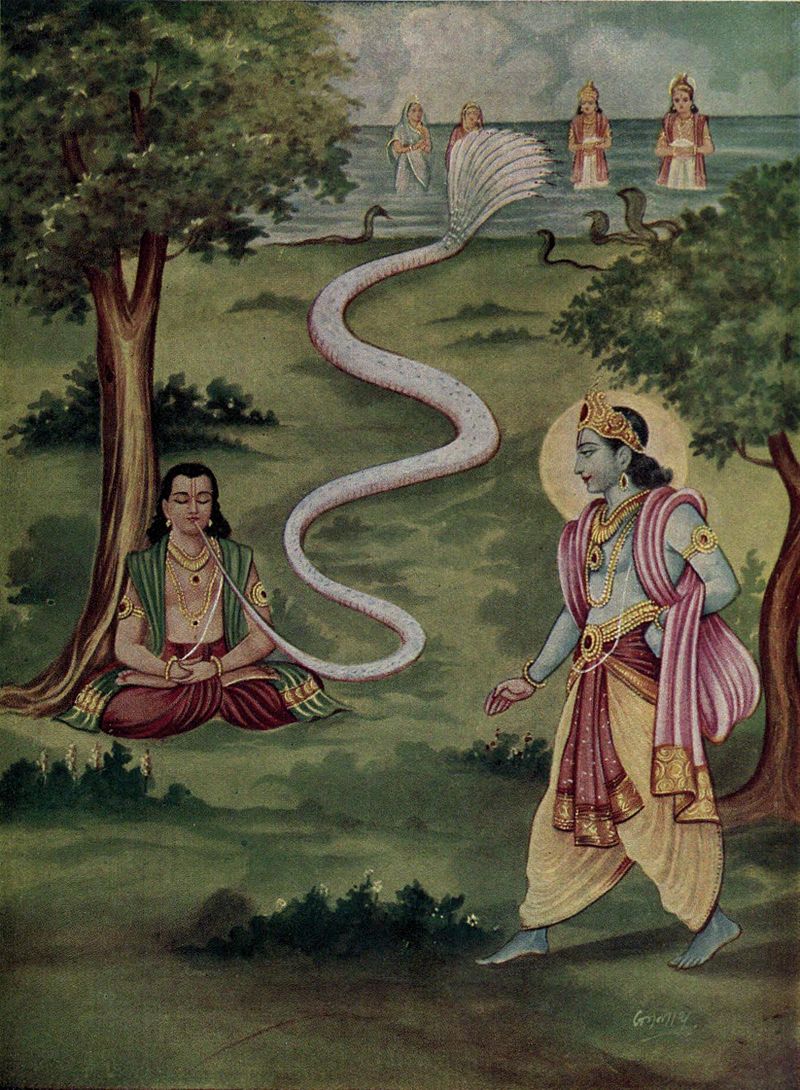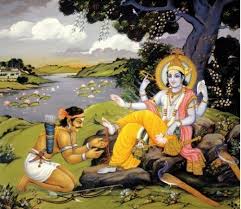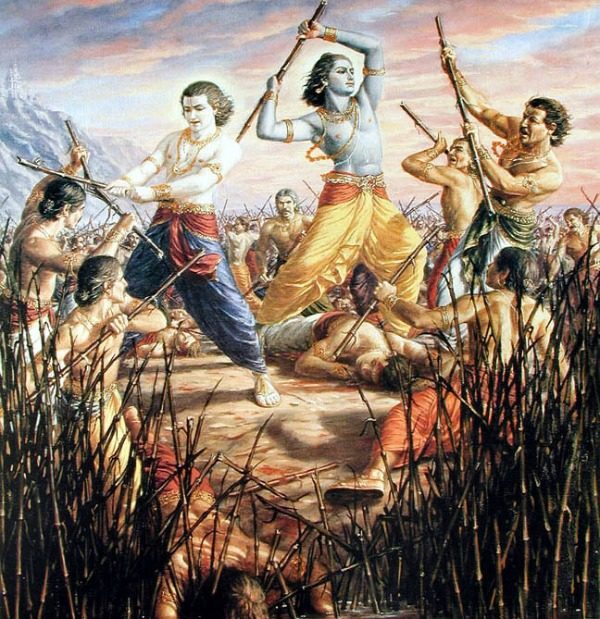The destruction of the Yadavas and the end of Krishna-Rama avatars
 One day, in the thirty-sixth year after the Mahabharata war, the Vrishni heroes, Sharana among them, saw Vishvamitra, Kanwa and Narada arrive at Dwaraka. Afflicted by the divine rod of chastisement, those heroes, causing Samba to be disguised like a woman, approached the ascetics and said: “This one is the wife of Babhru who is desirous of having a son. Rishis! Do you know for certain what this one will bring forth?”
One day, in the thirty-sixth year after the Mahabharata war, the Vrishni heroes, Sharana among them, saw Vishvamitra, Kanwa and Narada arrive at Dwaraka. Afflicted by the divine rod of chastisement, those heroes, causing Samba to be disguised like a woman, approached the ascetics and said: “This one is the wife of Babhru who is desirous of having a son. Rishis! Do you know for certain what this one will bring forth?”
Those ascetics, attempted to be thus deceived, said: “This Samba, heir of Krishna, will bring forth a fierce iron bolt for the destruction of the Vrishnis and the Andhakas. You wicked and cruel ones! Intoxicated with pride, through that iron bolt you will become the exterminators of your race with the exception of Rama and Krishna. Balarama, the blessed hero armed with the plough, will enter the ocean, casting off his body, while a hunter named of Jara will pierce Krishna while lying on the ground.” Having said so they then proceeded to see Krishna. Krishna, informed of what had taken place, summoned all the Vrishnis and told them of it. Possessed of great intelligence and fully acquainted with what the end of his race would be, he simply said “that which was destined would surely happen!” and entered his mansion. The Lord of the universe did not wish to ordain otherwise.
When the next day came, Samba actually brought forth an iron bolt through which all the individuals in the race of the Vrishnis and the Andhakas were to be consumed into ashes. Indeed, for the destruction of the Vrishnis and the Andhakas, Samba brought forth, through that curse, a fierce iron bolt that looked like a gigantic messenger of death. The fact was duly reported to the king. In great distress, the king Ugrasena caused that iron bolt to be reduced into fine powder. Men were employed to cast that powder into the sea. At the command of Ugrasena, Krishna, Rama, and Babhru, it was, again, proclaimed throughout the city that from that day, among all the Vrishnis and the Andhakas no one should manufacture wines and intoxicating spirits of any kind, and that whoever would secretly manufacture wines and spirits should be impaled alive with all his kinsmen. Through fear of the king, and knowing that it was the command of Rama, all the citizens bound themselves by a rule and abstained from manufacturing wines and spirits.
While the Vrishnis and the Andhakas were thus trying to avoid the impending calamity, the embodied form of Time every day wandered about their houses. He looked like a man of terrible and fierce aspect. Of bald head, he was black and of tawny complexion. Sometimes he was seen by the Vrishnis as he peered into their houses. The mighty bowmen among the Vrishnis shot hundreds and thousands of shafts at him, but none of these succeeded in piercing him, for he was none else than the Destroyer of all creatures. Day by day strong winds blew, and there arose many evil omens, awful and foreboding the destruction of the Vrishnis and the Andhakas. The streets swarmed with rats and mice. Earthen pots showed cracks or broke for no apparent reason. At night, the rats and mice ate away the hair and nails of slumbering men. Sarikas chirped, sitting within the houses of the Vrishnis. The noise made by those birds did not cease for even a short while by day or by night. The Sarashas were heard to imitate the hooting of the owl, and goats imitated the cries of jackals. Many birds appeared, impelled by Death, that were pale of complexion but that had legs red of hue. Pigeons were seen to always disport in the houses of the Vrishnis. Asses were born of kine, and elephants of mules. Cats were born of bitches, and mouse of the mongoose. The Vrishnis, committing sinful acts, were not seen to feel any shame. They showed disregard for Brahmanas, Pitris and the deities, They insulted and humiliated their preceptors and seniors. Only Rama and Krishna acted differently. Wives deceived their husbands, and husbands deceived their wives. Fires, when ignited, cast their flames towards the left. Sometimes they threw out flames of blue and red colours. The Sun, whether rising or setting, seemed to be surrounded by headless trunks of human form. In kitchens, the food that was clean and well-boiled, were seen, when served out for eating, with innumerable worms of diverse kinds. When Brahmanas, receiving gifts, blessed the day or the hour or when high-souled men were engaged in silent recitations, the heavy tread was heard of innumerable men running about, but no one could be seen. The constellations were repeatedly seen to be struck by the planets. None among the Yadavas could, however, obtain a sight of the constellation of his birth. When the Panchajanya was blown in their houses, asses of dissonant and awful voice brayed aloud from every direction.
Beholding these signs that indicated the perverse course of Time, and seeing that the day of the new moon coincided with the thirteenth lunation, Krishna, summoning the Yadavas, said unto them these words: “The fourteenth lunation has been made the fifteenth by Rahu once more. Such a day had happened at the time of the great battle of the Bharatas. It has once more appeared, it seems, for our destruction." Thinking upon the omens that Time showed, he understood that the thirty-sixth year had come, and that what Gandhari, burning with grief on account of the death of her sons, and deprived of all her kinsmen, had said was about to transpire. The present is exactly similar to that time when Yudhishthira noted at such awful omens when the two armies had been arrayed in order of battle. Krishna, having said so, endeavoured to bring about those occurrences which would make Gandharis words true. He commanded the Vrishnis to make a pilgrimage to some sacred water. The messengers forthwith proclaimed at the command of Krishna that the Vrishnis should make a journey to the sea-coast for bathing in the sacred waters of the ocean.
At that time the Vrishni ladies dreamed every night that a woman of black complexion and white teeth, entering their abodes, laughed aloud and ran through Dvaraka, snatching from them the auspicious threads in their wrists. The men dreamt that terrible vultures, entering their houses and fire-chambers, gorged themselves on their bodies. Their ornaments, umbrellas, standards and armour were seen to be taken away by terrible Rakshasas. In the very sight of the Vrishnis, the discus of Krishna, given by Agni, made of iron and having its nave composed of hardest adamant, ascended into the firmament. In the very sight of Daruka, the excellent car of Krishna, of solar effulgence, and properly equipped, was taken away by the horses yoked unto it. Those foremost of steeds, numbering four, (Saibya, Sugriva, Meghapushpa and Balahaka), and endued with the speed of thought, fled away, dragging the car along the surface of the ocean. The two great standards of Krishna’s car and Rama’s car, that with the device of Garuda and that bearing the device of the palmyra, which were reverently worshipped by those two heroes, were taken away by Apsaras who, day and night, called upon the Vrishnis and the Andhakas to set out on a pilgrimage to some sacred water.
When these omens were seen and heard, the mighty car-warriors of the Vrishnis and the Andhakas became desirous of setting out, with their whole families, on a pilgrimage to some sacred water. They prepared diverse kinds of viands, edibles and diverse kinds of wines and meat. The troops of the Vrishnis and the Andhakas, blazing with beauty and endued with fierce energy, then set out from the city on cars and steeds and elephants. The Yadavas, then, with their wives, proceeded to Prabhasa and took up their residence there, each in the temporary habitation that was assigned to him, and all having an abundance of provisions consisting of edibles and drink.
Hearing that they had taken up their abode on the sea-coast, Uddhava, who was well-versed in Yoga, proceeded there and took his leave for departing. Krishna, with joined hands, saluted Uddhava, and seeing him bent on departing from the world and knowing that the destructions of the Vrishnis was at hand, did not feel any disposition to prevent him. The mighty car-warriors among the Vrishnis and the Andhakas, whose hour had come, then saw Uddhava proceed on his great journey, filling the whole welkin with his splendour.
The Vrishnis, mixing with wine the food that had been cooked for high-souled Brahmanas, gave it away unto monkeys and apes. Those heroes of fierce energy then began their high revels, of which drinking formed the chief feature, at Prabhasa. The entire field echoed with the blare of hundreds of trumpets and abounded with actors and dancers plying their vocations. In the very sight of Krishna, Rama began to drink, with Kritavarma, Satyaki and Gada; and Babhru also did the same. Then Satyaki, inebriated with wine, derisively laughing at and insulting Kritavarma in the midst of that assembly, said, “What Kshatriya is there who, armed with weapons, will slay men locked in the embraces of sleep and, therefore, already dead? Hence, O Kritavarma, the Yadavas will never tolerate what you have done.” When Satyaki had said these words, Pradyumna applauded them, expressing his disregard for Kritavarma.
Highly incensed at this, Kritavarma, emphasising his disregard for Satyaki, by pointing to him with his left hand, said these words: “Professing yourself to be a hero, how could you so cruelly slay the armless Bhurishrava who, on the field of battle, gave up all hostile intentions and sat in praya?”
Hearing these words of his, Krishna, giving way to wrath, cast an angry glance at Kritavarma. Then Satyaki informed Krishna as to how Kritavarma had behaved towards Satrajit for taking away from him the celebrated gem Syamantaka. Hearing the narrative, Satyabhama, giving way to wrath and tears, approached Krishna and sitting on his lap enhanced his anger for Kritavarma. Then rising up in a rage, Satyaki said: “I swear to you by Truth that I shall soon cause this one to follow in the wake of the five sons of Draupadi, and of Dhrishtadyumna and Shikhandi, they that were slain by this sinful wretch, while they were asleep, with the assistance of Dronas son. Kritavarma’s period of life and fame have come to their end.”
Having said these words, Satyaki rushed at Kritavarma and severed his head with a sword in the very sight of Krishna. Satyaki, having achieved this feat, began to strike down others there present. Krishna ran to prevent him from doing further mischief. At that time, however, the Bhojas and Andhakas, impelled by the perverseness of the hour that had come upon them, all became as one man and surrounded Satyaki. Krishna, knowing the character of the hour, stood unmoved without giving way to anger at the sight of those heroes rushing in wrath at Satyaki from every side. Urged by fate and inebriated with drink, they began to strike Satyaki with the pots from which they had been eating. When Satyaki was being thus assaulted, Pradyumna became highly enraged. He rushed forward for rescuing Satyaki who was engaged with the Bhojas and the Andhakas. Endued with might of arms and wealth of energy, those two heroes exerted themselves with great courage. But as the odds were overwhelming, both of them were slain in the very sight of Krishna. Krishna, beholding his own son, and Satyaki too, slain, took up, in wrath, a handful of the Eraka grass that grew there. That handful of grass became a terrible bolt of iron endued with the energy of the thunderbolt. With it Krishna slew all those that came before him. Then the Andhakas and the Bhojas, the Saineyas and the Vrishnis, urged by Time, struck one another in that fearful melee. Indeed, whoever amongst them took up in wrath a few blades of the Eraka grass, these, in his hands, became soon converted into a thunderbolt. Every blade of grass there was seen to be converted into a terrible iron bolt. All this was due to the curse denounced by Brahmanas. He who hurled a blade of grass saw that it pierced through even such things as were utterly impenetrable. In fact, every blade was seen to become a terrible bolt having the force of thunder. Son killed sire, and sire killed son. Inebriated with wine, they rushed and fell upon one another. The Kukuras and the Andhakas met with destruction like insects rushing at a blazing fire.
As they were thus being slaughtered, no one among them thought of escaping by flight. Knowing that the hour of destruction had come, Krishna stood there, eyeing everything. Indeed, he stood, raising a bolt of iron formed of a blade of grass. Beholding that Samba was slain, as also Charudeshna, Pradyumna, Aniruddha, he became filled with rage. Beholding Gada lying dead on the ground, his wrath became enhanced. Krishna then exterminated the Vrishnis and the Andhakas. Babhru and Daruka then said to Krishna: “O holy one! A very large number of men has been slain by you. Turn now to where Rama has gone. We wish to go there where he has proceeded."
Then Daruka, Krishna and Babhru left that spot, following in the wake of Rama for discovering his retreat. They beheld that hero of infinite energy sitting thoughtfully, reclining his back against a tree, in a solitary spot of earth. Finding Rama, Krishna commanded Daruka, saying, “Going to the Kurus, inform Partha of this great slaughter of the Yadus. Let Arjuna come here quickly, hearing of the destruction of the Yadavas through the Brahmanas curse.”
Thus addressed, Daruka, deprived of his senses by grief, proceeded on a car to the capital of the Kurus. After Daruka had gone away, Krishna, seeing Babhru waiting on him, told him these words: “You go quickly for protecting the ladies. Let not robbers do them any injury, tempted by the wealth that is with them.” Thus commanded by Krishna, Babhru, still helpless with wine but cheerless at the slaughter of his kinsmen, departed. He had rested for a while by the side of Krishna, but as soon as he had proceeded to a distance, the iron-bolt, attaching itself to a mallet in the hands of a hunter, suddenly sprang of itself upon that solitary survivor of the Yadava race and slew him, who also had been included in the curse of the Brahmanas. Beholding Babhru slain, Krishna addressed his elder brother and said, “O Rama! Wait for me here till I place the ladies under the care of kinsmen.”
Entering the city of Dwarka, Krishna said these words unto his father, “You protect all the ladies of our house, till Arjuna comes. At the skirts of the forest, Rama is waiting for me. I shall meet him today. This great carnage of the Yadus has been beheld by me even as I beheld before the carnage of those Kshatriyas who were of Kurus race. It is impossible for me to see this city of the Yadavas without the Yadus beside me. Know that proceeding to the woods I shall practise penances with Rama.” Having said these words, Krishna touched the feet of his father with his head, and quickly left his presence. Then a loud wail of sorrow arose from the ladies and children of his house. Hearing that loud sound of wailing uttered by the weeping ladies, Krishna retraced his foot-steps and said unto them, “Arjuna will come here. He will relieve you of your grief.”
 Proceeding then to the forest, Krishna beheld Rama sitting in a solitary spot thereof. He also saw that Rama had set himself to Yoga and that from his mouth was issuing out a mighty snake. The colour of that snake was white. Leaving the human body in which he had dwelt so long, that Naga of a 1,000 heads and having a form as large as that of a mountain, endued besides with red eyes, proceeded along that way which led to the ocean. Ocean himself, and many celestial snakes, and many sacred Rivers were there, to receive him with honour. There were Karkotaka, Vasuki, Takshaka, Prithusravas, Varuna, Kunjara, Misri, Sankha, Kumuda, Pundarika, Dhritarashtra, Hrada, Kratha, Sitikantha, Chakramanda, Atishanda, Durmukha, Ambarisha, and king Varuna himself. Advancing forward and offering him the Arghya and water to wash his feet, and with diverse other rites, they all worshipped the mighty Naga and saluted him by making the usual enquiries.
Proceeding then to the forest, Krishna beheld Rama sitting in a solitary spot thereof. He also saw that Rama had set himself to Yoga and that from his mouth was issuing out a mighty snake. The colour of that snake was white. Leaving the human body in which he had dwelt so long, that Naga of a 1,000 heads and having a form as large as that of a mountain, endued besides with red eyes, proceeded along that way which led to the ocean. Ocean himself, and many celestial snakes, and many sacred Rivers were there, to receive him with honour. There were Karkotaka, Vasuki, Takshaka, Prithusravas, Varuna, Kunjara, Misri, Sankha, Kumuda, Pundarika, Dhritarashtra, Hrada, Kratha, Sitikantha, Chakramanda, Atishanda, Durmukha, Ambarisha, and king Varuna himself. Advancing forward and offering him the Arghya and water to wash his feet, and with diverse other rites, they all worshipped the mighty Naga and saluted him by making the usual enquiries.
After his brother had thus departed from the human world, Krishna of celestial vision, who was fully acquainted with the end of all things, wandered for some time in that lonely forest thoughtfully. Endued with great energy he then sat down on the bare earth. He had thought before this of everything that had been fore-shadowed by the words uttered by Gandhari in former days. He also recollected the words that Durvasa had spoken at the time his body was smeared by that Rishi with the remnant of the Payasa he had eaten while a guest at Krishna’s house. The high-souled one, thinking of the destruction of the Vrishnis and the Andhakas, as also of the previous slaughter of the Kurus, concluded that the hour for his own departure from the world had come. He then restrained his senses in Yoga. Conversant with the truth of every topic, Krishna, though he was the Supreme Deva, wished to die, for dispelling all doubts and establishing a certainty of results in the matter of human existence, simply for upholding the three worlds and for making the words of Atri’s son true. Having restrained all his senses, speech, and mind, Krishna laid himself down in high Yoga.
 A fierce hunter of the name of Jara then came there, desirous of deer. The hunter, mistaking Krishna, who was stretched on the earth in high Yoga, for a deer, pierced him at the heel with a shaft and quickly came to that spot for capturing his prey. Coming up, Jara beheld a man dressed in yellow robes, rapt in Yoga and endued with many arms. Regarding himself an offender, and filled with fear, he touched the feet of Krishna. The high-souled one comforted him and then ascended upwards, filling the entire welkin with splendour. When he reached Heaven, Indra, the twin Ashvinis, Rudra, the Adityas, the Vasus, the Vishvedevas, Munis, Siddhas, the Gandharvas, with the Apsaras, advanced to receive him. Then, the illustrious Narayana of fierce energy, the Creator and Destroyer of all, that preceptor of Yoga, filling Heaven with his splendour, reached his own inconceivable region. Krishna then met the Devas, celestial Rishis, Charanas, the foremost ones among the Gandharvas, many beautiful Apsaras, Siddhas and Saddhyas. All of them, bending in humility, worshipped him. The Devas all saluted him and many foremost of Munis and Rishis worshipped him who was the Lord of all. The Gandharvas waited on him, hymning his praises, and Indra also joyfully praised him.
A fierce hunter of the name of Jara then came there, desirous of deer. The hunter, mistaking Krishna, who was stretched on the earth in high Yoga, for a deer, pierced him at the heel with a shaft and quickly came to that spot for capturing his prey. Coming up, Jara beheld a man dressed in yellow robes, rapt in Yoga and endued with many arms. Regarding himself an offender, and filled with fear, he touched the feet of Krishna. The high-souled one comforted him and then ascended upwards, filling the entire welkin with splendour. When he reached Heaven, Indra, the twin Ashvinis, Rudra, the Adityas, the Vasus, the Vishvedevas, Munis, Siddhas, the Gandharvas, with the Apsaras, advanced to receive him. Then, the illustrious Narayana of fierce energy, the Creator and Destroyer of all, that preceptor of Yoga, filling Heaven with his splendour, reached his own inconceivable region. Krishna then met the Devas, celestial Rishis, Charanas, the foremost ones among the Gandharvas, many beautiful Apsaras, Siddhas and Saddhyas. All of them, bending in humility, worshipped him. The Devas all saluted him and many foremost of Munis and Rishis worshipped him who was the Lord of all. The Gandharvas waited on him, hymning his praises, and Indra also joyfully praised him.

Very interesting. Reveals how weak we are without divine help. It also makes it amply clear that Time is the creator, preserver and the destroyer all rolled into one.
How true!!